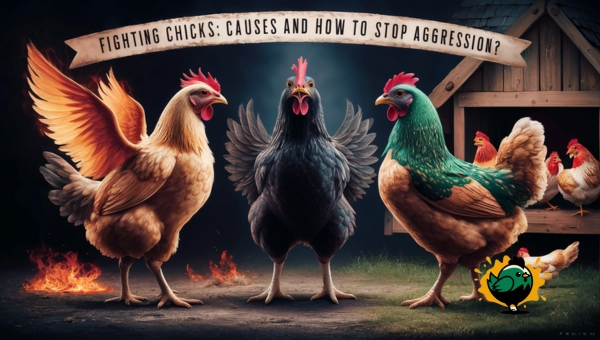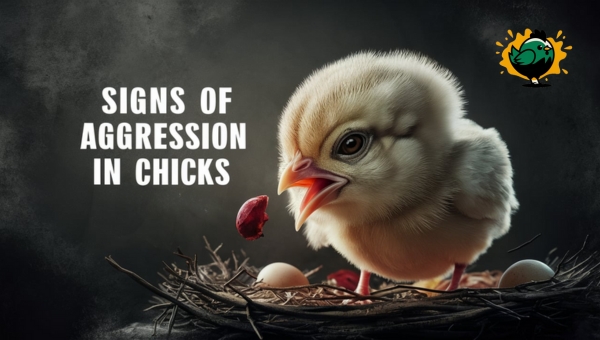Fighting Chicks | Causes and How to Stop Aggression?

You wake up one morning to find your chicks pecking each other aggressively. What’s going on? Understanding the causes behind fighting chicks can help you manage and nurture a harmonious flock.
Whether it’s establishing a pecking order or coping with stress, these behaviors are more common than you think. Let’s delve into why chicks fight and explore solutions to keep your feathered friends peaceful and happy.
Why Do Chicks Fight?
Understanding why chicks fight is key to maintaining a peaceful environment for them. Fighting behaviors can seem alarming, but they often arise from natural instincts and environmental factors. Let’s delve into the primary reasons behind these squabbles and how to manage them effectively.

Natural Pecking Order
Chicks naturally establish a pecking order as part of their development. This hierarchy determines access to resources like food and water. The dominant chick often pecks at others to assert its position.
This behavior, seen in many bird species, helps reduce overall conflict by clarifying roles within the group. As they grow, chicks learn to navigate these social dynamics, which is essential for their integration into adult flocks.
Lack of Space
Overcrowded environments can significantly contribute to fighting chicks. When space is limited, competition for resources intensifies, leading to increased aggression. Providing enough space allows chicks to establish their territories and reduces stress.
It’s crucial to ensure that each chick has enough room to move freely and engage in natural behaviors without feeling threatened by others.
Stress Factors
Various stress factors can lead to fighting among chicks. Addressing these stressors is crucial for maintaining harmony within the flock.
Some common stress factors include:
- Hunger: Insufficient food supply can cause frustration and aggression.
- Temperature Changes: Extreme heat or cold can make chicks irritable.
- Noise: Loud environments can increase anxiety levels.
Ensuring a balanced diet, stable temperature, and a quiet environment can help minimize fighting behaviors. Recognizing and managing these stressors effectively can foster a more peaceful setting for your chicks.
Also Read: Caring for Aging Hens | Essential Tips and Tricks
Signs of Aggression in Chicks
Recognizing signs of aggression in chicks is essential for maintaining a peaceful environment. Here are key indicators to watch for:

- Pecking: Consistent pecking at other chicks often shows dominance or irritation.
- Chasing: Aggressive chasing can cause stress and fear among weaker chicks.
- Loud Vocalizations: Frequent crowing or squawking might indicate discomfort or aggression.
- Isolation: Chicks isolating themselves could be victims of bullying.
- Feather Pulling: Pulling out feathers from other chicks is a strong sign of aggression.
- Wing Flapping: Excessive wing flapping can be a display of dominance or agitation.
Observing these behaviors early allows for timely intervention, which helps in reducing conflicts. By addressing these signs promptly, you can create a more harmonious environment for your chicks. Regular monitoring and understanding their social dynamics are crucial steps in managing aggression.
How to Stop Fighting Chicks?
To effectively manage and reduce fighting among chicks, consider these strategies:

- Provide Adequate Space: Ensure each chick has enough room to move freely, reducing competition for resources.
- Monitor Food Supply: Regularly check that all chicks have access to food and water. This prevents hunger-induced aggression.
- Minimize Stressors: Create a calm environment by controlling noise levels and maintaining a stable temperature. Stress can significantly increase aggressive behaviors.
- Separate Aggressive Individuals: If certain chicks consistently display aggressive behavior, consider isolating them temporarily. This helps protect the more vulnerable chicks.
- Introduce Distractions: Provide toys or perches to keep chicks occupied. Engaged chicks are less likely to fight.
- Observe Behavior: Keep an eye on interactions. Early intervention can prevent minor disputes from escalating.
By implementing these measures, you can foster a more harmonious environment for your chicks.
Also Read: Why Chickens Stop Laying Eggs – Key Factors Explained
Preventing Aggression in Chicks
Preventing aggression in chicks is essential for their healthy development and well-being. By focusing on early socialization, managing environmental factors, and providing a balanced diet, we can significantly reduce aggressive behaviors. Let’s explore each of these areas in detail.
Early Socialization
Early socialization is crucial in curbing aggressive tendencies in chicks. When chicks are exposed to each other early on, they learn social cues and how to interact peacefully.
This helps them develop positive relationships and reduces the likelihood of fighting in the long run. Encouraging regular interaction among chicks fosters a harmonious environment, making them more adaptable and less prone to aggression.
Managing Environmental Factors
Managing environmental factors plays a pivotal role in preventing stress-induced aggression.
Here are some key elements:
- Temperature Control: Maintain a stable and comfortable temperature to keep chicks calm.
- Food and Water Availability: Ensure constant access to fresh food and clean water.
- Clean Living Space: Regularly clean the coop to prevent disease and promote comfort.
By addressing these factors, you can create a stress-free environment that supports healthy behavior.
Balanced Diet
A balanced diet is fundamental in reducing aggression among chicks. Nutritional deficiencies can lead to behavioral issues, making it important to focus on their diet.
Here are some dietary considerations:
- Protein Levels: Ensure adequate protein to support growth and energy.
- Vitamins and Minerals: Provide essential vitamins like A, D3, and E to maintain health.
- Hydration: Always ensure access to fresh water to keep them hydrated.
By paying attention to their nutritional needs, you can help minimize aggressive tendencies and promote overall well-being.
Conclusion
Understanding and addressing the reasons behind fighting chicks is crucial for maintaining a peaceful and healthy flock. By recognizing the natural pecking order, ensuring adequate space, and managing stress factors, you can significantly reduce aggression among your chicks.
Additionally, early socialization, managing environmental factors, and providing a balanced diet are key preventive measures. These steps will help you create a harmonious environment where your chicks can thrive.
For more insightful tips and guides on poultry care, be sure to explore other blogs on our site. Your journey to a healthier, happier flock starts here!
